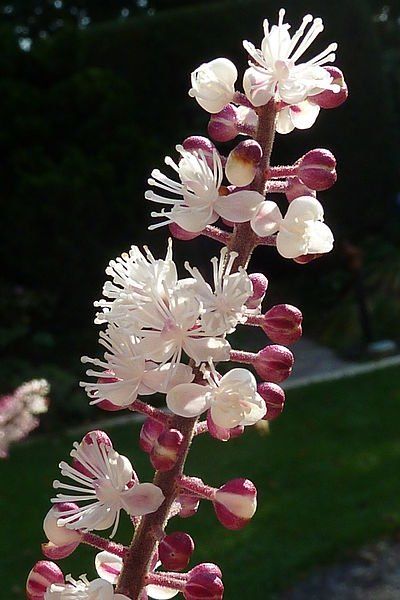ABC Investigates Black Cohosh Adulteration in Latest Bulletin
The fifth bulletin from the Botanical Adulterants Program explores both accidental and intentional adulteration of black cohosh supplements.
Photograph by Schnobby/Wikimedia Commons/CC-BY-SA-3.0.

Whether it’s intentional or accidental, black cohosh (Actaea racemose) adulteration remains a significant issue for the herb commonly used to alleviate menopausal symptoms. In hopes of increasing awareness of the problem, the Botanical Adulterants Program has released a new Botanical Adulterants Bulletin (BAB) that offers a comprehensive explanation of black cohosh adulteration and the best analytical approaches to detect it.
This latest BAB is the fifth released by the Botanical Adulterants Program, a joint effort of the American Botanical Council (Austin, TX), the American Herbal Pharmacopoeia (AHP), and the National Center for Natural Products Research (NCNPR). The bulletins, which debuted earlier this year, are also now available for grape seed, bilberry fruit, skullcap, and goldenseal.
As with the other bulletins in the series, the black cohosh bulletin details known adulterants, frequency of adulteration, safety issues relating to adulteration, and analytical techniques for detecting adulteration. And while it covers some similar information outlined in previous ABC publications on black cohosh, including a 2013 HerbalGram article by Steven Foster and a 2015 Black Cohosh Laboratory Guidance Document, the new bulletin also includes new updates and scientific advances.
“Adulteration of black cohosh continues to be a problem,” said Stefan Gafner, PhD, ABC’s chief science officer, technical director of the Botanical Adulterants Program, and author of the black cohosh bulletin. “Since the publication of Foster’s HerbalGram review on black cohosh adulteration and the Laboratory Guidance Document last year, new studies have confirmed the illegal substitution of botanical material labeled as ‘black cohosh’ with closely-related Asian plants; however, these Asian species are different from authentic North American black cohosh.”
In keeping with the Botanical Adulterants Program’s commitment to peer-reviewed research, seven reviewers contributed to the black cohosh bulletin.
“Our publication of this new bulletin will help responsible companies in the herb and dietary supplement industry to exercise appropriate extra diligence in quality control testing to ensure that they are selling authentic North American black cohosh,” said Mark Blumenthal, founder and executive director of ABC and director of the Botanical Adulterants Program.
More BABs are scheduled for publication in the months ahead, ABC said, including the sixth bulletin, which will cover adulteration of arnica (Arnica montana) flower.
Read more:
Goldenseal Bulletin Details Adulteration Threats
New Botanical Adulterants Bulletins from American Botanical Council Dive Deep into Herbal Fraud
Dietary Supplements: New Testing Tools to Catch Botanical Adulteration
Michael Crane
Associate Editor
Nutritional Outlook Magazine
michael.crane@ubm.com

.png&w=3840&q=75)

.png&w=3840&q=75)



.png&w=3840&q=75)



.png&w=3840&q=75)









